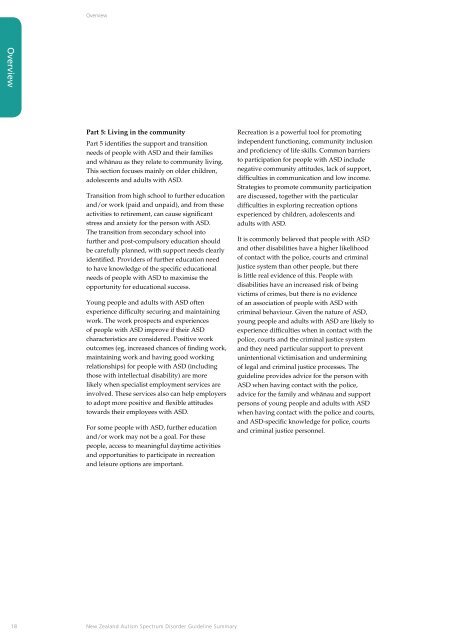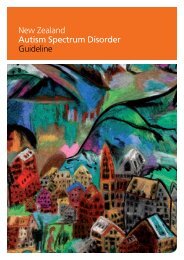New Zealand Autism Spectrum Disorder ... - Ministry of Health
New Zealand Autism Spectrum Disorder ... - Ministry of Health
New Zealand Autism Spectrum Disorder ... - Ministry of Health
You also want an ePaper? Increase the reach of your titles
YUMPU automatically turns print PDFs into web optimized ePapers that Google loves.
Overview<br />
Overview<br />
Part 5: Living in the community<br />
Part 5 identifies the support and transition<br />
needs <strong>of</strong> people with ASD and their families<br />
and whänau as they relate to community living.<br />
This section focuses mainly on older children,<br />
adolescents and adults with ASD.<br />
Transition from high school to further education<br />
and/or work (paid and unpaid), and from these<br />
activities to retirement, can cause significant<br />
stress and anxiety for the person with ASD.<br />
The transition from secondary school into<br />
further and post-compulsory education should<br />
be carefully planned, with support needs clearly<br />
identified. Providers <strong>of</strong> further education need<br />
to have knowledge <strong>of</strong> the specific educational<br />
needs <strong>of</strong> people with ASD to maximise the<br />
opportunity for educational success.<br />
Young people and adults with ASD <strong>of</strong>ten<br />
experience difficulty securing and maintaining<br />
work. The work prospects and experiences<br />
<strong>of</strong> people with ASD improve if their ASD<br />
characteristics are considered. Positive work<br />
outcomes (eg, increased chances <strong>of</strong> finding work,<br />
maintaining work and having good working<br />
relationships) for people with ASD (including<br />
those with intellectual disability) are more<br />
likely when specialist employment services are<br />
involved. These services also can help employers<br />
to adopt more positive and flexible attitudes<br />
towards their employees with ASD.<br />
For some people with ASD, further education<br />
and/or work may not be a goal. For these<br />
people, access to meaningful daytime activities<br />
and opportunities to participate in recreation<br />
and leisure options are important.<br />
Recreation is a powerful tool for promoting<br />
independent functioning, community inclusion<br />
and pr<strong>of</strong>iciency <strong>of</strong> life skills. Common barriers<br />
to participation for people with ASD include<br />
negative community attitudes, lack <strong>of</strong> support,<br />
difficulties in communication and low income.<br />
Strategies to promote community participation<br />
are discussed, together with the particular<br />
difficulties in exploring recreation options<br />
experienced by children, adolescents and<br />
adults with ASD.<br />
It is commonly believed that people with ASD<br />
and other disabilities have a higher likelihood<br />
<strong>of</strong> contact with the police, courts and criminal<br />
justice system than other people, but there<br />
is little real evidence <strong>of</strong> this. People with<br />
disabilities have an increased risk <strong>of</strong> being<br />
victims <strong>of</strong> crimes, but there is no evidence<br />
<strong>of</strong> an association <strong>of</strong> people with ASD with<br />
criminal behaviour. Given the nature <strong>of</strong> ASD,<br />
young people and adults with ASD are likely to<br />
experience difficulties when in contact with the<br />
police, courts and the criminal justice system<br />
and they need particular support to prevent<br />
unintentional victimisation and undermining<br />
<strong>of</strong> legal and criminal justice processes. The<br />
guideline provides advice for the person with<br />
ASD when having contact with the police,<br />
advice for the family and whänau and support<br />
persons <strong>of</strong> young people and adults with ASD<br />
when having contact with the police and courts,<br />
and ASD-specific knowledge for police, courts<br />
and criminal justice personnel.<br />
18<br />
<strong>New</strong> <strong>Zealand</strong> <strong>Autism</strong> <strong>Spectrum</strong> <strong>Disorder</strong> Guideline Summary











